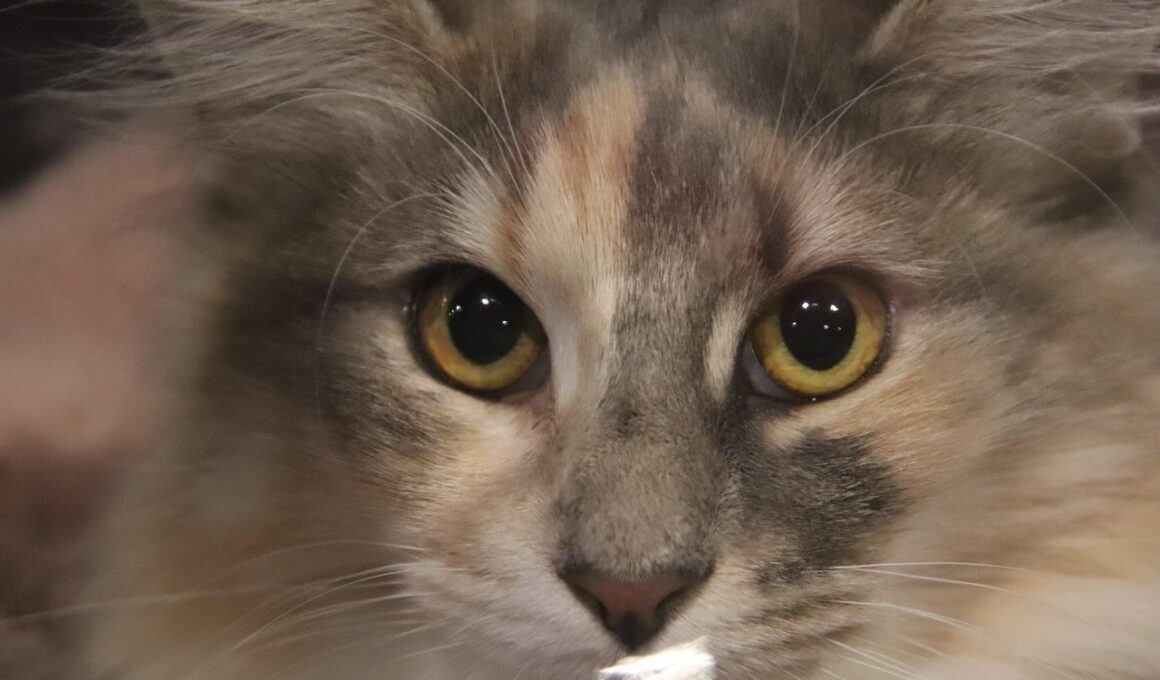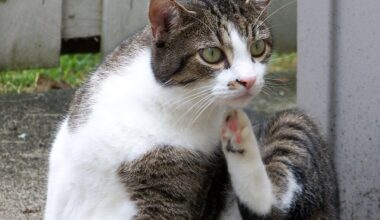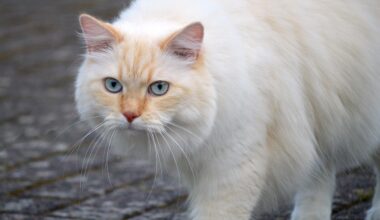The Impact of Cat Shows on Cat Health and Welfare
Participating in cat shows can profoundly influence both the health and welfare of felines. Cat shows create a platform where breeders, owners, and enthusiasts gather to celebrate various breeds, showcasing their physical attributes and temperaments. These events enable breeders to access a larger audience, promoting responsible breeding practices that prioritize the health of cats. Moreover, participating cats undergo meticulous health checks, ensuring they are free from genetic disorders and communicable diseases. This rigorous scrutiny often leads to a higher standard in breeding practices across the industry. Additionally, cat shows offer education regarding feline care, nutrition, and health management. Owners gain insights into ordinary grooming routines, proper nutrition, and socialization methods from experts and fellow participants alike. The focus is primarily on enhancing the health of the showcased felines and ensuring their well-being in the long run. Cat shows foster a sense of community among enthusiasts, allowing breeders to share experiences, which can lead to better care techniques. Through interactions at these events, participants often forge meaningful connections that enhance their understanding of cat welfare guidelines, ultimately benefiting the feline population at large.
Moreover, cat shows can serve as vital networking hubs for breeders and veterinarians. At these events, breeders can seek advice from pet health professionals, ensuring they have access to updated information on veterinary practices. This direct interaction with experts allows for the dissemination of new findings in feline health management, solidifying best practices among breeders. By working closely with veterinarians, breeders can select mates that lower the chances of hereditary health conditions, improving the overall lineage and health of future generations. Additionally, cat shows frequently emphasize the importance of vaccinations and preventative care, reminding breeders of the responsibilities they have toward their cats. Engaging discussions often emerge at these events that address common health issues encountering particular breeds. These conversations allow for collaborative solutions to be developed, further enhancing the knowledge base of all attendees. Consequently, cat shows contribute to the well-being of cats beyond a one-time event. They act as launching pads for educational campaigns and initiatives promoting responsible ownership. This gathering of knowledge promotes sustainable practices that lead to healthier cats and, ultimately, a thriving feline community across various regions.
Furthermore, the competitive nature of cat shows can have a positive effect on the overall look and health of cat breeds. Judges evaluate felines based on strict standards dictated by breed organizations, which encourages breeders to adhere closely to health guidelines. Breeders who are keen on winning championships are more likely to invest in health screening and proper socialization of their cats. In turn, this attention to health impacts the general population of each breed, as healthy individuals are more often seen at these events. By emphasizing physical standards that consider both looks and health, the shows promote a dual focus among breeders. Better breeding practices are slowly modifying how breeds evolve, fostering genetic diversity and reducing the risk of hereditary health issues. Moreover, creating a competitive environment entails that potential adopters look for well-bred kittens. As demand grows for healthier cats, it ensures that breeders increasingly prioritize health checks in their programs. Additionally, success in shows can significantly raise a breed’s profile, which in turn can lead to increased awareness of health issues specific to them, strengthening advocacy efforts toward rescue and rehabilitation.
The Broader Impact of Cat Shows on Breeds
The health benefits of cat shows extend beyond mere competition; they play a pivotal role in raising awareness about breeding ethics and practices. As the audience grows, so does the interest in seeking healthier breeds. More individuals are becoming aware of the need for ethical breeding practices, leading to a collective movement that champions responsible breeding. This awareness is also reflected in breed clubs that host workshops and seminars at these events, focusing on genetic management, breeding ethics, and health challenges posed to various breeds. Such platforms encourage breeders to collaborate and share information concerning health issues specific to their breeds. This initiative not only improves the knowledge base among participants but helps to refine breeding practices across the board. Additionally, these discussions contribute to more effective policies regarding feline welfare in the broader context. The collective knowledge gained through shows can impact legislative measures as societies become aware of the intricate ties between breeding practices and animal welfare. Enhanced policies result from a shared commitment to promoting health and well-being in cats, strengthening communities and future breeding standards.
Moreover, the focus on rehabilitation services and the welfare of rescue cats becomes more pronounced at cat shows. With the spotlight on these well-bred eyesores, it creates an opportunity to spotlight less fortunate felines. Many cat shows now feature adoption booths and educational talks regarding improving the life of rescue cats and promoting spaying and neutering every cat. This promotes a culture of compassion and responsibility among attendees, encouraging them to consider adopting rather than purchasing purebred cats. By fostering meaningful conversations surrounding the importance of rescue and the role of cat shows in the animal welfare movement, these events leverage their platform for social good. The informative sessions and pamphlets often distributed draw participants’ attention to the challenges rescuers face in their daily work. This entices potential adopters to consider cats in need of homes, positively impacting both rescuers and the animals. Furthermore, as more people engage with the rescue community, fostering partnerships between rescues and breeders becomes seamless, creating a larger network focused on happy, healthy cats.
In addition to health and welfare, cat shows also play a significant role in enhancing the socialization of cats. The environment of cat shows exposes felines to different sounds, sights, and other cats, contributing to their adaptability. Proper socialization is paramount for a cat’s behavior and emotional health; participating in events allows for gradual acclimatization to varied situations so that they grow into well-rounded adults. This exposure helps reduce anxiety issues among cats helping them become sociable companions when they live in homes. The routine presence of various people provides cats with a chance to learn favorable interactions in unfamiliar environments. It builds confidence, essential for their long-term well-being. This can lead to healthier and more emotionally secure pets who integrate seamlessly into families. Such invaluable experiences teach cats how to navigate the world, enhancing their overall quality of life. Consequently, breeders see measurable benefits from enhanced behavior and socialization, making their cats more appealing to potential adopters, further promoting responsible ownership and safer communal environments for these beloved pets.
Conclusion: The Future of Cat Shows and Their Influence
In conclusion, the positive impact of cat shows on feline health and welfare cannot be overstated. The combined efforts of breeders, veterinarians, and cat enthusiasts create a unified front that benefits cats across the board. As participants gather to discuss best practices, innovations in breed standards, and the latest in health management, it fosters a culture that prioritizes responsibility. This results in healthier breeds, a greater focus on rescue efforts, and enhanced socialization for felines. Participation in cat shows spreads awareness about ethical breeding practices while advocating the well-being of all cats, whether purebred or mixed. It solidifies the importance of community engagement in lifting the general standard for the future generations of cats. The sustainability of feline health directly correlates with the collective investment of those involved in cat shows. By striving for better health, owners not only uplift their own cats but contribute to the collective welfare of felines everywhere. The engagement in these events ensures that as cat culture evolves, the focus remains solely, and compellingly, on the welfare, health, and holistic well-being of our beloved feline friends.
The future of cat shows seems bright as more individuals recognize their influence on cat health and welfare. Encouraging trends may continue to enhance fostering education, responsibility, and ethical breeding practices among communities. With this focus, it is crucial to maintain dialogue surrounding the importance of these shows. Continued participation guarantees the necessary platform for ongoing education, exchanging insights, and promoting health-centric breeding practices. As awareness broadens, the responsibility to implement sustainable practices shifts toward responsible ownership, which reinforces the interlinked well-being of cats and their communities. To maximize their positive impact, cat shows can evolve further by incorporating a stronger emphasis on educational aspects regarding mental wellness, social opportunities, and health management. By embracing an innovative approach, there is potential for a brighter future for our feline companions. Offering online resources and workshops can reach an even wider audience, enhancing access and education on feline welfare. As these changes take hold, both the feline population’s health and the community’s respect toward cat ownership will flourish, ultimately benefiting all stakeholders involved in nurturing our companion animals.


